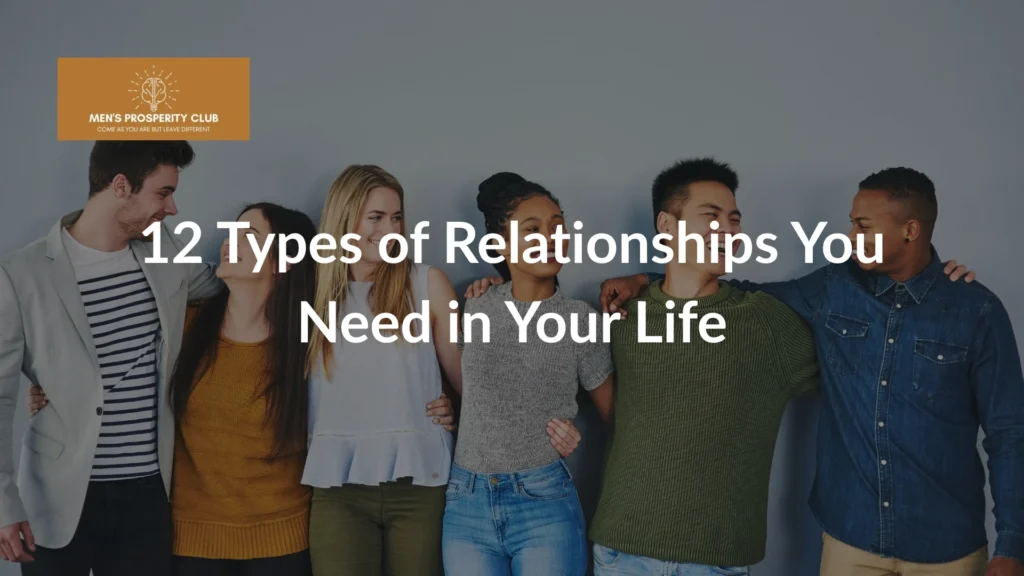Relationships shape our lives, providing emotional support, growth and connection. From family to friends, colleagues and mentors, each relationship offers unique value, impacting our mental and physical well-being. While it’s easy to overlook their importance, nurturing meaningful relationships is key to living a balanced and fulfilling life. Strong connections help reduce stress and promote happiness. Understanding the 12 essential types of relationships can offer valuable insights into how to cultivate and maintain healthy dynamics. Recognising and managing toxic relationships is equally important, ensuring that your connections contribute positively to your life and personal growth.
What is a Relationship?
A relationship, in its broadest sense, refers to any connection between two or more individuals. These connections can range from family ties to friendships, romantic partnerships, professional collaborations and even acquaintanceships. Each type of relationship serves a different purpose and holds varying levels of emotional and social significance.
Understanding the different types of relationships is crucial for maintaining healthy dynamics. For example, the approach to a friendship differs greatly from that of a professional relationship, requiring distinct boundaries and communication styles. Similarly, family relationships may involve unconditional love, while work connections are often built on shared goals and respect. By recognising the unique characteristics of each relationship, we can better manage expectations, nurture positive interactions and prevent misunderstandings. A well-rounded understanding of relationships fosters respect and emotional health, ensuring that every connection—whether personal or professional—remains fulfilling and mutually beneficial.
The Core 12 Types of Relationships
Understanding the diverse nature of relationships is essential for personal growth, professional success and emotional wellbeing. These relationships span various levels of intimacy, from acquaintanceships to familial bonds, each serving distinct roles in our lives. Below is a comprehensive guide to the twelve most common types of relationships, their significance, and the impact they have on our personal and professional spheres.
1. Acquaintanceships: The Foundation of Networking
Acquaintances are the initial connections we make, often through casual interactions. While they may not carry the depth of a friendship, acquaintances are crucial in professional networking and social expansion. They provide access to new opportunities, ideas and potential collaborations. These relationships may evolve into deeper connections or remain limited to networking, depending on mutual interests.
In professional settings, acquaintances are often the bridge to further opportunities, such as introductions to clients, collaborators or employers. By maintaining a friendly and approachable demeanour, these relationships can grow into lasting professional partnerships or even personal friendships.
2. Friendships: The Pillars of Support
Friendships are vital to emotional health. Built on trust, shared experiences, and emotional support, they offer a deep level of connection. Friends provide a source of comfort, advice, and stability during both joyous and challenging times.
Friendships can be categorised into close friends—those who provide intense emotional support—and casual friends, who may not share the same depth of connection but still offer companionship and enjoyment. The importance of both types lies in their ability to contribute to our sense of belonging and emotional security.
3. Family Bonds: Unconditional Love and Support
Family relationships, whether biological or chosen, provide a solid foundation of support. These bonds are rooted in shared history, values and deep emotional connections. While family dynamics can sometimes be complex, maintaining healthy family relationships is key to personal growth and resilience.
Chosen family refers to those close friends or mentors who offer unconditional support and love, often filling the roles of biological family members. For individuals estranged from their biological relatives, a chosen family can become an essential source of stability and emotional nourishment.
4. Romantic Relationships: The Art of Emotional and Physical Connection
Romantic relationships are characterised by deep emotional and physical attraction. They involve vulnerability, trust, and a commitment to mutual growth. While romantic relationships can bring immense fulfilment, they require clear communication, respect, and an understanding of each other’s values and needs.
Whether monogamous or open, successful romantic relationships are founded on mutual respect, shared goals and emotional intimacy. The stages of romantic relationships vary, but the underlying principles of communication and respect are essential for long-term success.

5. Platonic Relationships: Deep Connections Without Romance
Platonic relationships, while non-romantic, offer emotional closeness and intimacy without the complexities of physical attraction. These relationships are rooted in trust, shared values, and mutual respect. Platonic connections provide a safe space for individuals to express themselves authentically, without the pressures associated with romantic involvement.
These relationships can enhance personal growth by offering emotional stability and support. Whether they exist between friends, family or colleagues, platonic relationships are integral to maintaining a balanced emotional and social life.
6. Casual Relationships: Freedom with Boundaries
Casual relationships are characterised by their lack of commitment or long-term expectations. Often short-term, these relationships can range from casual dating to friendships that don’t involve deep emotional attachment. In romantic contexts, they typically involve limited intimacy without the expectation of progression into a committed relationship.
While casual relationships offer flexibility and freedom, they require clear boundaries and communication to avoid misunderstandings. When handled well, they can be fulfilling, but without proper understanding of each other’s expectations, they can lead to emotional confusion or distress.
7. Professional Relationships: Balancing Work and Personal Boundaries
Professional relationships are fundamental to career success and personal growth. These relationships are characterised by mutual respect, collaboration, and shared professional goals. In the workplace, these relationships foster teamwork, innovation, and productivity. However, it is essential to maintain boundaries to prevent burnout, stress and conflicts of interest.
Clear communication and respect for each other’s roles and boundaries are key to sustaining healthy professional relationships, ensuring they remain mutually beneficial without encroaching on personal time or space.
8. Mentor-Mentee Relationships: Learning and Growth
Mentor-mentee relationships are characterised by the exchange of knowledge, wisdom and guidance. Mentors provide valuable advice and support, helping mentees navigate personal or professional challenges. This relationship can be transformative for both parties, with mentors gaining satisfaction from guiding others, while mentees develop new skills and perspectives.
Mentorship fosters confidence, direction and purpose in mentees, providing them with a roadmap for success. For mentors, the relationship offers the opportunity to give back, share expertise, and contribute to the growth of others.

9. Collaborative Relationships: Achieving Common Goals
Collaboration is central to both personal and professional success. These relationships are built around shared goals, teamwork and mutual responsibility. Whether in business, community projects or academic ventures, collaboration allows individuals to pool resources, expertise, and creativity to achieve objectives that would be difficult to realise alone.
Successful collaboration requires open communication, trust and a commitment to collective success. The ability to navigate differences, compromise, and respect diverse perspectives is essential to achieving the best outcomes.
10. Spiritual Relationships: Connecting Beyond the Physical
Spiritual relationships are based on shared beliefs, practices and values that go beyond the physical and emotional aspects of human connection. These relationships often occur within religious communities, meditation groups or other spiritual spaces, where individuals come together to explore a common sense of purpose or faith.
Spiritual relationships offer deep emotional support and a sense of belonging, helping individuals align with their values and sense of self. They encourage self-reflection, empathy, and connection to something greater, fostering personal growth and healing.
11. Parent-Child Relationships: Nurturing and Guiding Future Generations
The parent-child relationship is one of the most significant and formative bonds in life. Parents offer love, guidance, and emotional support, shaping their child’s understanding of the world and their role within it. As children grow, the dynamic between parent and child evolves, with parents balancing nurturing with fostering independence.
Effective communication and respect for the child’s evolving needs are key to maintaining a healthy relationship. Parents who adapt to their child’s changing developmental stages provide a foundation for lifelong emotional support and resilience.
12. Sibling Relationships: Lifelong Bonds of Support
Sibling relationships are some of the most enduring connections we have.These bonds are often characterised by shared history, mutual understanding, and camaraderie. Siblings provide a unique form of support, offering guidance and companionship across various life stages.
While sibling relationships may involve rivalry or competition, they also provide opportunities for growth, empathy, and lifelong companionship. Open communication and mutual respect are essential for maintaining healthy sibling relationships, ensuring they remain supportive throughout life.
Relationships shape every aspect of our lives, from our emotional well-being to our career development. Each type, from casual acquaintanceships to deep family connections, serves a unique purpose and offers valuable experiences. By understanding and nurturing these diverse bonds, we can build a strong network of support, growth, and fulfilment. Whether in a professional or personal context, relationships offer opportunities for mutual success, emotional stability, and lifelong learning. The key to all healthy relationships lies in open communication, mutual respect, and a shared commitment to growth and understanding.

Toxic Relationships: Recognising When to Walk Away
A toxic relationship is one that negatively impacts your well-being, whether emotionally, mentally, or physically. Unlike healthy relationships that encourage mutual respect, trust, and personal growth, toxic relationships are often characterised by manipulation, disrespect, dishonesty, or emotional abuse. Recognising the signs of toxicity is essential to protect your mental health and emotional well-being.
Clear Signs of a Toxic Relationship
Manipulation
Manipulation in toxic relationships often involves one person trying to control the other for personal gain. This may manifest in various forms such as guilt-tripping, gaslighting (making you question your perception of reality), or emotional blackmail. Manipulation undermines your confidence and leaves you feeling uncertain or confused about your thoughts, actions, or feelings. According to a study by Mind (the mental health charity), 75% of people in toxic relationships reported experiencing manipulation, which significantly harmed their self-esteem.
Disrespect
Disrespect in toxic relationships can show itself through belittling comments, ignoring boundaries, or dismissing your feelings. If your opinions, values, or limits are consistently disregarded, this could indicate disrespect in the relationship. A report by Relate, the UK’s largest relationship support charity, found that 67% of individuals in unhealthy relationships experience disrespect, leading to frustration and emotional distress.
Dishonesty
Trust is the cornerstone of any healthy relationship. In toxic relationships, dishonesty erodes this foundation. If you find that your partner, friend or family member frequently lies or hides the truth, it’s a clear sign of toxicity. Dishonesty can range from minor lies to more serious deceit, affecting your safety or emotional health. The UK Office for National Statistics (ONS) reports that 62% of individuals in toxic relationships struggle with consistent dishonesty, undermining their trust and emotional well-being.
Constant Criticism
While constructive criticism can foster growth, constant, harsh criticism, especially when unsolicited, is damaging. If you are consistently made to feel inferior or incapable, this indicates a toxic dynamic. Research by The British Psychological Society (BPS) shows that persistent negative feedback significantly lowers self-esteem, and 54% of individuals in toxic relationships report feeling constantly criticised, which harms their emotional health.
Control and Possessiveness
In toxic relationships, one person often attempts to control the other. This can manifest in various forms, from controlling where you go and whom you spend time with, to isolating you from family and friends. Over time, such controlling behaviour can make you feel trapped and powerless.
According to Women’s Aid, controlling behaviour is a prevalent feature in abusive relationships and can significantly affect the victim’s sense of independence and emotional well-being. It’s important to recognise that this type of manipulation can have long-lasting effects, leaving individuals feeling vulnerable and without control over their own lives.
Codependency and Unhealthy Dependence
Codependency is often present in toxic relationships, where one person becomes excessively reliant on the other for emotional, mental, or financial support. While all relationships involve some level of dependence, toxic relationships can lead to an imbalanced and suffocating dynamic. The National Domestic Abuse Helpline highlights that unhealthy dependence is a significant issue, with many individuals in toxic relationships feeling unable to function independently, which can lead to emotional burnout and further isolation.
Identifying and Dealing with Toxic Relationships
The first step in addressing a toxic relationship is recognising the signs. Once identified, it’s crucial to assess whether it’s worth trying to repair or if it’s better to walk away. In some cases, open communication, setting boundaries, or seeking professional help can resolve issues. However, in many cases, the healthiest decision is to distance yourself from the person or end the relationship entirely.
Recognising Your Worth
It can be challenging, but recognising your own worth is essential in breaking free from toxic relationships. You may feel emotionally invested or responsible for the other person’s well-being, but your mental health must always come first. According to The Mental Health Foundation, 78% of people who removed themselves from toxic relationships reported improved mental health and emotional well-being after distancing themselves.
How to Set Boundaries in All Relationships
Boundaries are essential in maintaining healthy dynamics in any relationship. Without them, relationships can become imbalanced, leaving one person feeling overwhelmed, drained, or disrespected. Setting clear boundaries helps protect your emotional and mental well-being while also promoting healthier relationships.
Actionable Tips for Setting Boundaries:
- Know Your Limits
Before setting boundaries, it’s important to reflect on what makes you feel uncomfortable or stressed. Understanding your limits helps you communicate them clearly to others, ensuring healthy relationships. For example, if you need alone time after social events, establish this early on. Clear boundaries foster respect and prevent burnout, allowing you to maintain balance and engage in relationships without compromising your emotional or mental well-being. - Be Clear and Direct
It’s important to be clear and straightforward when setting boundaries. Avoid vague or passive-aggressive communication. Use simple, unambiguous language to express your needs. For example, say, “I need time alone to recharge,” rather than hinting at it. This ensures your needs are understood and respected. - Stay Consistent
Consistency is key to boundary-setting. It’s easy to let boundaries slide occasionally, but being inconsistent can confuse others and weaken your efforts. Stick to your boundaries firmly, even when it feels uncomfortable. People will respect your boundaries over time. - Don’t Apologise for Your Boundaries
Setting boundaries is not something you need to feel guilty about. Your emotional health is valid, and you have the right to prioritise it. Whether it’s declining an invitation or asking for personal space, you don’t need to over-explain or apologise for your needs. - Practice Self-Care
Setting boundaries is a form of self-care. By protecting yourself from burnout and emotional exhaustion, you ensure that you have the energy and emotional capacity to engage in healthy, fulfilling relationships. According to Mind, people who prioritise self-care are 41% less likely to experience emotional burnout, contributing to healthier relationships. - Respect Others’ Boundaries
Healthy boundaries work both ways. Just as you communicate your own limits, it’s important to respect the boundaries of others. Pay attention to both verbal and non-verbal cues and honour the limits others set in their relationships with you.
The Importance of Communication and Self-Respect in Boundary-Setting
Communication is central to effective boundary-setting. It’s not just about stating your limits but also discussing them in a way that fosters mutual respect. Clear communication ensures that boundaries are understood and respected, reducing misunderstandings or resentment.
Equally important is self-respect. Setting boundaries requires recognising your worth and standing firm in protecting your emotional health. When you set and maintain boundaries, you signal that you value yourself, which not only strengthens your relationships but also promotes your personal growth.
How to Keep Your Relationships Healthy
Healthy relationships require good communication. Effective communication fosters understanding, empathy, and connection. It enables individuals to express feelings, desires, and concerns openly, while also listening attentively to others.
The Importance of Communication
Without effective communication, misunderstandings can arise, leading to conflict and emotional distance. Poor communication can quickly escalate minor disagreements into major issues. Research from Relate found that couples who engage in open communication are 60% more likely to experience long-term relationship satisfaction.
Strategies for Improving Communication Skills
- Active Listening
Active listening involves focusing completely on what the other person is saying, without interrupting. Showing respect and understanding involves being present and attentive. The UK Communication Association reports that 78% of successful relationships feature high levels of active listening. - Honest Conversations
Honest communication builds trust. Express your feelings clearly and respectfully, using “I” statements (e.g., “I feel hurt when…”). This avoids blame and promotes transparency. - Non-Violent Communication (NVC)
Non-violent communication encourages empathetic dialogue, focusing on observation, feelings, needs, and requests. It promotes peaceful and constructive exchanges, even in difficult situations.
Respect and Appreciation: Building Lasting Bonds
Mutual respect and appreciation form the bedrock of strong relationships. They create an environment where both individuals feel valued, understood, and loved.
The Role of Respect in Relationships
Respect involves acknowledging the other person’s boundaries, opinions, and feelings without judgment. It fosters a sense of safety, allowing individuals to express themselves freely. Research by The British Psychological Society shows that 86% of healthy relationships feature high levels of mutual respect.
The Importance of Appreciation
Appreciation strengthens emotional bonds and boosts self-esteem. Small acts of kindness, gratitude, and acknowledgment create an environment of positivity, ensuring both parties feel supported and valued.
Managing Conflict: Navigating Disagreements
Conflict is unavoidable, but how we deal with it can change everything. Healthy conflict resolution can strengthen relationships, deepen trust, and promote personal growth.
Conflict Resolution Strategies
- Stay Calm and Composed: Manage your emotions to avoid escalating the situation.
- Focus on the Issue, Not the Person: Separate the problem from the person to avoid personal attacks.
- Understand the Other Person’s Perspective: Show empathy and actively listen.
- Seek Compromise: Identify a solution that honours both viewpoints.
Recognising toxic relationships and setting healthy boundaries are essential for maintaining mental and emotional well-being. By fostering effective communication, mutual respect, and appreciation, we can cultivate relationships that are supportive, fulfilling and balanced.
The Power of Healthy Relationships
Healthy relationships are essential for maintaining both our mental and physical well-being. The connections we build with family, friends, colleagues and romantic partners have a profound impact on our emotional health, stress levels and even our longevity. A wealth of research from UK-based studies supports the idea that relationships not only contribute to our emotional fulfilment but also play a significant role in maintaining physical health.
Positive Impact on Mental Health
One of the most immediate benefits of healthy relationships is their positive influence on mental health. Emotional support from friends and family helps mitigate feelings of loneliness and isolation, which can contribute to mental health issues such as depression and anxiety. According to the Mental Health Foundation in the UK, people with strong social support systems are less likely to experience depression, as these connections offer a protective effect against stress and emotional difficulties. When individuals have someone to turn to, they feel more secure and supported, reducing the burden of mental health challenges.
A study conducted by the University of Oxford found that people who have close friendships are better equipped to handle life’s challenges and report a higher quality of life. These supportive relationships provide a sense of belonging, which has been shown to be crucial for emotional resilience. Furthermore, engaging in open conversations with trusted individuals reduces emotional suppression, enabling individuals to process their feelings in a healthy way. The ability to speak openly about emotions reduces the likelihood of these feelings becoming overwhelming, providing a crucial outlet for emotional expression.
Stress Reduction and Physical Health
The health benefits of strong relationships extend beyond mental health and have direct implications for physical well-being. Social support is crucial in reducing stress and its associated health risks. Research published by the British Heart Foundation suggests that strong social connections lower levels of cortisol (a stress hormone), which can reduce the risk of developing heart disease and other stress-related conditions. The presence of close relationships acts as a buffer against stress, helping individuals to cope more effectively with challenging situations.
The National Institute for Health and Care Excellence (NICE) also reports that healthy relationships play a role in reducing the physiological impact of stress, such as high blood pressure. By managing stress more effectively, individuals with strong social ties are less likely to suffer from chronic health conditions, ultimately contributing to a longer and healthier life. Stress is a major factor in the development of many chronic conditions, including hypertension, cardiovascular disease, and diabetes. Thus, healthy relationships serve as a protective factor for both mental and physical health.
Contribution to Longevity and Happiness
The link between healthy relationships and longevity has been supported by multiple studies, including research from the University of Bristol, which highlights the importance of social ties in extending lifespan. According to their findings, people with close relationships tend to live longer and enjoy better health outcomes than those who are isolated. The study found that strong social connections reduce the risk of premature death and prevent chronic illnesses that are commonly associated with loneliness and isolation. Social connections not only contribute to longer life but also enhance the quality of that life.
In addition to longevity, relationships are integral to overall happiness. A study by The UK Social Integration Commission revealed that people with a high level of social integration—meaning they have meaningful, supportive relationships—report higher levels of life satisfaction. Strong relationships provide emotional support, shared experiences, and opportunities for social engagement, all of which contribute to greater happiness and life satisfaction. Those who feel emotionally connected to others are more likely to experience positive emotions, a sense of purpose, and greater contentment with life.
Building a Balanced Social Network
Building and maintaining a balanced social network is crucial for managing life’s complexities. A diverse network of relationships—ranging from family and close friends to colleagues and acquaintances—provides the support needed to navigate different life situations, whether personal, professional, or emotional. The strength of a diverse social network lies in its ability to offer various forms of support and insight, which can help individuals cope with challenges in different areas of their lives. This network offers a variety of resources, from emotional support to practical advice, and is integral in helping individuals maintain their mental and physical well-being.
The Importance of a Diverse Social Network
A diverse network exposes individuals to a wide range of perspectives, helping them approach problems with fresh insights. Relationships with people from various backgrounds, experiences, and professions broaden one’s outlook on life and enhance problem-solving abilities. This is particularly valuable when facing personal challenges or decisions, as it allows individuals to consider a variety of solutions and viewpoints. Moreover, a diverse network encourages personal growth by allowing individuals to learn from different experiences and cultures, expanding their understanding of the world.
Support in Different Areas of Life
Different types of relationships support different areas of life. Family members may offer unconditional emotional support, friends can provide companionship and understanding, while colleagues or mentors offer professional guidance. A well-rounded social network ensures that individuals have the necessary support across all areas of their life, whether it’s navigating a career change, dealing with a personal crisis, or celebrating a success. Each type of relationship contributes something unique, helping to balance the emotional, professional and social aspects of life.
Navigating Life’s Challenges
Life is filled with unexpected challenges, and having a diverse support network makes navigating these situations much easier. For example, during a health crisis, family might offer emotional support, while friends can provide practical help. In contrast, professional setbacks may require guidance from mentors or colleagues. Having access to a variety of supportive individuals allows people to handle challenges more effectively. This flexibility in support ensures that no matter what life throws their way, individuals have the resources they need to cope with difficult situations.
Tips for Building and Maintaining a Balanced Social Network
Invest in Relationships with Purpose
Make an effort to build relationships that are meaningful and purposeful. Take the time to nurture bonds with people who bring positivity, support, and encouragement into your life. These connections can be with family, friends, mentors, or even colleagues. When relationships are built on mutual respect and shared values, they provide a deeper sense of fulfilment and security.
Seek Quality, Not Quantity
A diverse network doesn’t mean you need to have a vast number of connections. It’s more important to focus on the quality of the relationships. A smaller circle of supportive, trustworthy individuals can be far more beneficial than having a large number of shallow acquaintances. Quality relationships are those that provide emotional depth, mutual respect, and understanding, which are the foundation for a fulfilling social network.
Stay Open to New Connections
Don’t close yourself off to new relationships. Attend networking events, join community groups, or participate in social activities to meet new people. Building a network that is both diverse and dynamic can provide additional support when needed and open doors to new opportunities. Embracing new connections adds richness and variety to your social network, helping you to grow both personally and professionally.
Give Back and Be Reciprocative
Healthy relationships are based on reciprocity. It’s important to not only seek support but also offer it to others. Helping others when they need it strengthens relationships and creates a balanced, give-and-take dynamic. Offering support to friends and family in times of need fosters mutual respect and a sense of connectedness.
Final Thoughts: Embracing the Power of Healthy Relationships
Healthy relationships are key to a well-rounded, fulfilling life. They provide essential emotional support and are crucial for stress reduction, mental health, and physical well-being. Research from UK-based institutions such as the Mental Health Foundation and the British Heart Foundation demonstrates the significant impact social connections have on our health, helping to combat loneliness, improve emotional resilience, and even contribute to longevity.
Building a balanced, diverse social network offers the support needed to navigate life’s challenges. A varied network provides emotional, professional, and practical assistance, helping individuals cope more effectively with obstacles. By focusing on quality relationships and prioritising meaningful connections, we create a robust support system that can help us thrive in both difficult and joyous times.
Investing in and nurturing relationships is an ongoing but rewarding process. These connections not only improve mental and physical health but also bring increased happiness and fulfilment. Ultimately, healthy relationships give us the resilience and support we need to lead a more fulfilling life.




